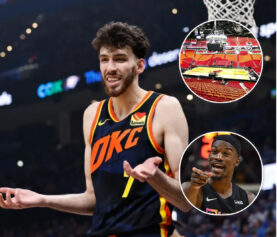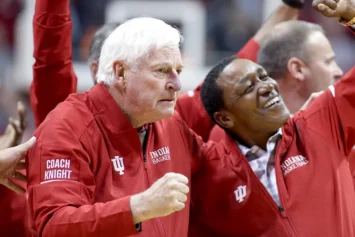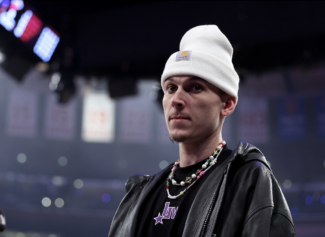Isiah Lord Thomas III was the author of the first truly great performance I can personally remember. I can recall great moments before June 19, 1988…moments. I watched Magic Johnson’s junior-junior sky hook win Game 4 of the 1987 Finals. That was a great shot. But the first time I finished watching a game as kid and felt like I had just watched a man do something remarkable throughout the game, was when Zeke dropped 43 on the Lakers in Game 6 of the ’88 Finals. A record 25 of those points came in the third quarter. Most of them came on a severely sprained ankle. I was only nine years old at the time, but I had spent hundreds of hours next to my father on the couch, watching games and getting schooled – enough time to know that I had just watched something valiant.
The greatest players get it done. The Pistons lost Game 6 and the series, but not without Isiah fighting for what looked like his life.
I just spent a season marked by a chorus of voices trying to convince me that Tony Parker was legitimately the most valuable player in the NBA through the first half of the season, that he was one of the five best players in the league, and that he was the best point guard alive. My beef with TP was always that he was window dressing – a pretty melody without much soul. Tony Parker, transcendent? Nah, fam. Over the past two seasons, however, I switched positions, even if I still didn’t hold Parker in quite as high esteem as the critical mass of basketball fans.
Coming into these Finals, after sonning Steph Curry in the conference semis and then dropping a couple of masterful performances against the Grizzlies in the WCFs, I was drinking the Kool-Aid. Then Games 6 and 7 of these Finals happened and we’re almost right back to where we started.
Hobbled by a sore hamstring, there was little chance that Parker was going to dominate the Heat and dictate the outcome of the series like he had grown capable – especially not with LeBron stalking him like a manic ex. That wasn’t the expectation; much like few expected the practically crippled Dwyane Wade to go 2006-Wade on the Spurs for the duration of the Finals. Yet, Wade eked out a couple of vintage performances that will nestle comfortably into his growing legend. Wade’s grit was the stuff of champions. Meanwhile, Parker sleepwalked through two possible closeout games, failing to impact the game in any real way once he could no longer blow by his opponent to the cup or create that gulf of space for his mid-range jumper.
Gone was Tony the Maestro, back again was Tony the Cog.
**********
This month, in an ESPN The Magazine piece on the Spurs’ love affair with foreign hoopers, coach Gregg Popovich railed against the foreign player stigmas:
“‘ They wouldn’t play defense, they wouldn’t socialize, they wouldn’t learn English, they weren’t strong dribblers, they couldn’t handle a reduced role, they were soft.’ I thought that was really ignorant.”
And then there was his opinion that foreign hoopers were “fundamentally harder working than most American kids.”
Word, Pop? Because I can almost vividly remember you not totally buying into the Tony Parker era.
In fact, before the Parker era, R.C. Buford has said the Spurs had a chance to pick a point guard 1999 draft, but they “came to the conclusion that Pop would never play a foreign point guard.”
But check this exchange of quotes from a Dan Wetzel piece a few years ago:
“We didn’t think he was tough enough,” Popovich said.
“Coach Pop said, ‘I never want to see him again,’” Parker said.
Another workout was set up, though. The Spurs still loved the talent. “We stacked it and had some people go after him physically,” Popovich said. “And he was fantastic in that one.”
Those quotes are from a satisfied Pop and a vindicated Parker in 2007, moments after he and the Spurs had won their third title in five years. Parker was the Finals MVP. Looking back, watching Parker hoist that MVP trophy, with Tim Duncan standing by his side, made me dig in on my anti-Parker stance ever harder.
Am I missing something , I asked myself. Parker played such a specialized role with that Spurs offense and had a minimal impact on defense. How could any smart observer deem his performance in that Spurs sweep to be more valuable or important than Duncan’s? It was Duncan, after all, who required the consistent double teams, that really was navigating Pop’s system, and that anchored a Spurs defense that made a not-quite-ready LeBron James upchuck Similac.
TP was a backseat dude . Duncan was pushing that whip. At most, Parker was riding shotgun and had to get permission from Timmy to mess with the AC or fiddle with the iPod.
It only took Pop one workout to change his opinion of Tony Parker. It took me almost a decade. Gradually, Pop reconstructed his system to compliment Parker’s all-world talent of getting wherever he wanted to on the court. Gradually, Parker became a much more keen decision-maker, controlling everything the Spurs did on the offensive side. And, again, gradually, Parker began assuming more of a leadership role until, startlingly, we started watching frequent footage of him running Spurs timeouts while Pop took a little time off. We could forgive his defensive deficiencies since he was such a virtuoso on offense and his whole squad fed off his talent and stewardship. Last week, I could say with relative certainty that TP would end his career as one of the greatest point guards of all time, a first ballot Hall of Famer. No astute hoops head would be able to name a dozen point guards before dropping Parker’s name on their all-time point guard list. As a former detractor and someone who used to view Parker as nothing more than a flawed cog in Pop’s system with a special talent, that was a lot for me to admit.
Here’s the thing, though: We’ve grown into a sports culture that judges the greatest players based on very draconian standards. Ask LeBron. Within this context it should have always been noted that with Parker as the Spurs’ “front seat dude” pushing the whip, they routinely got busy in the regular season and then underwhelmed in the playoffs. So, after receiving a few breaks this season (the James Harden trade, the Russell Westbrook injury), it was time for Parker to transcend. That’s what we expect out of the great ones, right? But Parker let a hamstring completely jack his mojo. Zeke wouldn’t have gone out like that. Chris Paul and Steve Nash would have found another way to impact the game, even if it was strictly through the force of personality.
Hall of Fame voters surely won’t hold this against TP on his first ballot, nor should they. But the 2013 Finals will be a part of Parker’s legacy. It’s also a reminder of what I had almost forgotten: With Parker at the wheel, you’re only going but so far.



